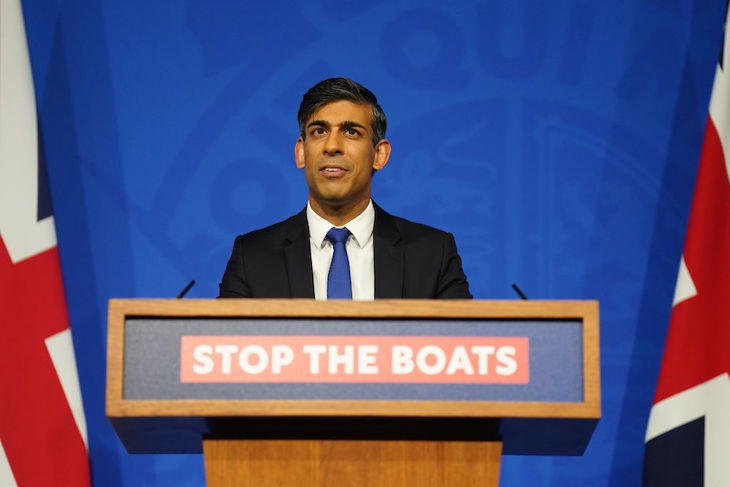Rishi Sunak is a drab technocrat mired in a failed political paradigm and with a tin ear for public opinion. And yet to blame him for the current dreadful state of the Conservative party is largely to miss the point.
The Tory party is facing an extinction-level general election result, not primarily because of Sunak but because it has reached a philosophical dead end. It has proved time and again over the past few years that it is incapable of addressing the foundational issue of border control, even while in possession of a bumper House of Commons majority.
As I have pointed out many times before, restoring robustness to our immigration and asylum system is the top priority among Conservative-leaning voters. According to YouGov’s latest issues index, it is running ten points clear of the state of the economy among 2019 Tory voters. And yet such voters have been served up with half a decade’s worth of unremitting failure to control legal immigration levels as well as to ‘stop the boats’.
It is facile to blame Sunak alone
Take the current Rwanda Bill. Only around 60 Conservative MPs backed amendments designed to bolster it against the disabling prospect of individual appeals and the effect of European Court of Human Rights emergency injunctions. Since then, the head of the ECHR has confirmed its view that member nations are indeed obliged to obey these so-called ‘Rule 39’ orders, just as the Tory rebels had warned.
Yet it is facile to blame Sunak alone for this failure of nerve. During the legislation’s Commons passage leading lights from among the 106-strong ‘One Nation’ caucus of left-wing Tory MPs made clear that the incorporation of strengthening amendments would cause them to join with Labour to vote it down. So no Tory prime minister could have delivered legislation guaranteed to remove illegal immigrants to Rwanda.
It follows that dumping Sunak and replacing him with a more gifted performer or someone more in tune with right-of-centre voters will not crack the basic problem. A Kemi Badenoch or Suella Braverman pre-election premiership would, in essence, amount to an invitation to re-elect the same divided parliamentary party with the same substantial blocking minority of ‘liberal Conservatives’ within it.
And right-of-centre voters do not want that. They will no longer rally to the party of Tobias Ellwood, Robert Buckland, Theresa May and Caroline Nokes. On several of the most major issues of the day – penal policy, foreign aid policy and the war-on-woke are other examples – such establishment-minded politicians generally line up alongside Labour and the Liberal Democrats and against the instincts of the electoral coalition that returned the Tories in 2019.
Across the western world we can see that it is anti-establishment and pro-nation political offers that are making dramatic electoral progress, not the global summit-goers of the conventional backslapping ‘centre-right’. And as the rise of Reform UK in the polls illustrates, there is growing potential for that to be the case in Britain soon too.
It was often said that Boris Johnson’s relationship with Tory MPs was strictly ‘transactional’ – based on the idea that they would support him only on condition that he won elections. This was odd given that in most respects he was far more a globalist liberal than a national conservative. But indeed, as soon as he fell behind in the polls, they ditched him. The same was true of Liz Truss. Yet it does not seem true of Sunak.
Installed by MPs against the wishes of the grassroots, this prime minister is clearly a more authentic representation of the overall dispositions of the present crop of Conservative parliamentarians. In this regard, there is not just one Rishi Sunak on the green leather benches but about 200 different versions of him. In other words, it is the troops who are the problem as much as the general who leads them.
When Johnson – under relentless pressure from Dominic Cummings – withdrew the whip from a couple of dozen establishment-minded and Brexit-blocking Tory MPs, many pundits said it would be the final nail in his coffin. In fact, the move served as a springboard for a huge election win a few months later. It turned out that right-of-centre voters loved the idea of a leader taking their side against the massed ranks of chinless wonders.
Sunak’s removal as PM is undoubtedly a necessary condition for a Tory electoral recovery but it is not a sufficient one. The party will not win again while its parliamentary ranks are so dominated by patrician liberals.
This article is free to read
To unlock more articles, subscribe to get 3 months of unlimited access for just $5








Comments
Join the debate for just $5 for 3 months
Be part of the conversation with other Spectator readers by getting your first three months for $5.
UNLOCK ACCESS Just $5 for 3 monthsAlready a subscriber? Log in